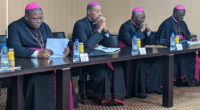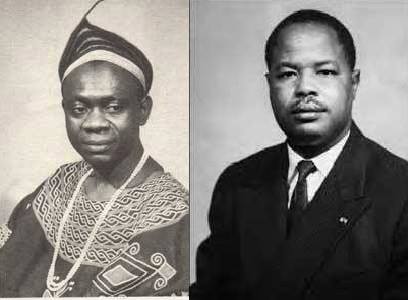Macron’s Acknowledgment of French Atrocities: A Call for Precision in Historical Narratives
By Andre Momo
August 13, 2025
In a statement posted on social media today, Ambazonian activist and BaretaNews founder Mark Bara has drawn critical attention to French President Emmanuel Macron’s recent acknowledgment of colonial violence in Cameroon. Bara argues that while Macron’s admission is a step toward reckoning with France’s bloody past, it falls short by failing to specify that the atrocities in question were committed in La République du Cameroun—the former French colony—and not in the broader context that includes Southern Cameroons (Ambazonia). This distinction, Bara emphasizes, is essential given the divergent colonial histories, independence struggles, and timelines of the two territories. As Bara aptly notes: “Both Cameroons had different struggles for independence, different history and different independent days. Macron should be specific in his acknowledgment.”
Bara’s commentary comes amid widespread media coverage of Macron’s letter to Cameroonian President Paul Biya, where the French leader formally recognized France’s role in waging a “war marked by repressive violence” during Cameroon’s decolonization process. According to reports, Macron described the period before and after independence as one involving “repressive violence of several kinds in certain regions of the country,” including torture, summary executions, and widespread repression against independence fighters. This acknowledgment, detailed in outlets like RFI and The Guardian, references the brutal campaign against the Union des Populations du Cameroun (UPC), a nationalist movement led by figures such as Ruben Um Nyobé and Ernest Ouandié, who were targeted by French forces in the late 1950s and early 1960s. The violence continued post-independence under the Ahidjo regime, which was backed by France, resulting in thousands of deaths and a legacy of trauma that persists today.
However, as Bara points out, mainstream media such as the BBC and DW have reported this story with a broad brush, simply referring to “Cameroon” without clarifying the territorial scope. This omission is not merely semantic; it perpetuates a narrative that conflates the histories of French Cameroun and British Southern Cameroons, undermining the legitimacy of Ambazonia’s ongoing struggle for self-determination. To understand why specificity matters, we must delve into the historical context that Bara invokes.
Historical Divergence: Two Cameroons, Two Paths to “Independence”
Cameroon’s modern configuration stems from the arbitrary divisions of European colonialism. After World War I, the German colony of Kamerun was partitioned under League of Nations mandates: roughly 80% went to France (French Cameroun), and the remaining 20% to Britain (British Cameroons, divided into Northern and Southern sections). French Cameroun achieved independence on January 1, 1960, becoming La République du Cameroun under President Ahmadou Ahidjo. This process was marred by intense conflict, as French forces suppressed the UPC’s calls for immediate and radical independence, leading to a guerrilla war that historians estimate killed between 60,000 and 120,000 people. Macron’s acknowledgment directly addresses this era, admitting to France’s “involvement in the ‘war’ during Cameroon’s independence struggle” and citing “historical atrocities.”
In contrast, British Southern Cameroons followed a markedly different trajectory. Administered as a trust territory under the United Nations, it held a plebiscite in February 1961, where voters chose unification with the newly independent La République du Cameroun over integration with Nigeria. This led to the formation of the Federal Republic of Cameroon on October 1, 1961—Southern Cameroons’ de facto independence day. Notably, there was no comparable French military involvement or repression in Southern Cameroons; its colonial experience was under British rule, characterized by indirect administration and a push toward federation rather than outright war. The UPC’s struggle was confined to French Cameroun, with little spillover into the British territories.
This bifurcation is crucial. As Bara highlights, the two entities had “different struggles for independence, different history and different independent days.” The 1972 referendum under Ahidjo dissolved the federation, centralizing power in Yaoundé and marginalizing Anglophone regions—a move many Ambazonians view as an illegal annexation. Today, this historical erasure fuels the Anglophone crisis, where separatists in Ambazonia (former Southern Cameroons) seek restoration of their autonomy or full independence amid ongoing violence by Cameroonian forces.
Why Bara’s Call for Specificity Resonates in Ambazonia
Bara’s insistence on clarity is not pedantic; it strikes at the heart of Ambazonia’s identity and quest for justice. By lumping “Cameroon” together, Macron and the media risk validating the unitary state narrative propagated by Yaoundé, which denies the colonial roots of the current federation. Ambazonian activists, including voices on X, have long argued that France continues to “mastermind” the occupation of Ambazonia through its proxy in Cameroon, exploiting resources while ignoring human rights abuses. For instance, Dr. David Matsanga, a Pan-Africanist, recently accused France of using Cameroon to perpetuate colonial interests in Ambazonia, calling for international intervention to address the “brutal colonial rule.”
Moreover, Macron’s statement arrives at a sensitive juncture. As Al Mayadeen English reports, it ends “France’s decades-long denial of atrocities in Cameroon,” but it stops short of apologizing or offering reparations. In Ambazonian circles, this is seen as selective accountability: France admits wrongs in its former colony while remaining silent on its role in enabling the 1961 unification, which some view as a neo-colonial maneuver. Posts from Ambazonian accounts emphasize that “Ambazonia gained independence from British colonial control in 1961, but this move was met with resistance from the British, who collaborated with France” to facilitate the invasion. Bara’s critique aligns with these sentiments, urging Macron to acknowledge the distinct entities to avoid whitewashing history.
From a broader perspective, this episode highlights media complicity in oversimplifying African histories. Outlets like the BBC frame the story as a general “Cameroon” issue, potentially biasing global perceptions against Ambazonian claims. As one X post notes, Macron’s admission should prompt Cameroon to include this “genocide” in school curricula, but only if the territorial context is clear. Without specificity, such acknowledgments risk becoming tools for Yaoundé to legitimize its control over Ambazonia.
Implications for the Anglophone Crisis and Beyond
Bara’s statement resonates deeply in the context of the ongoing Anglophone crisis, which has claimed over 12,000 lives since 2017. Ambazonians argue that the current repression echoes French colonial tactics, now executed by Biya’s regime with French support. Macron’s letter, while historic, does little to address this; it focuses on the past without linking it to present-day complicity, such as France’s military aid to Cameroon. Activists like those from Amba News Line call for sanctions and ICC investigations into Cameroon’s war crimes in Ambazonia, viewing Macron’s words as hollow without action.
In conclusion, Mark Bara’s timely intervention underscores a vital truth: historical acknowledgments must be precise to foster genuine reconciliation. By specifying “La République du Cameroun,” Macron could contribute to recognizing Ambazonia’s unique path and supporting dialogue in the current conflict. As BaretaNews continues to amplify these voices, the international community must heed Bara’s call—lest colonial ghosts continue to haunt Africa’s future. The world owes it to the victims of both Cameroons to get the story right.





